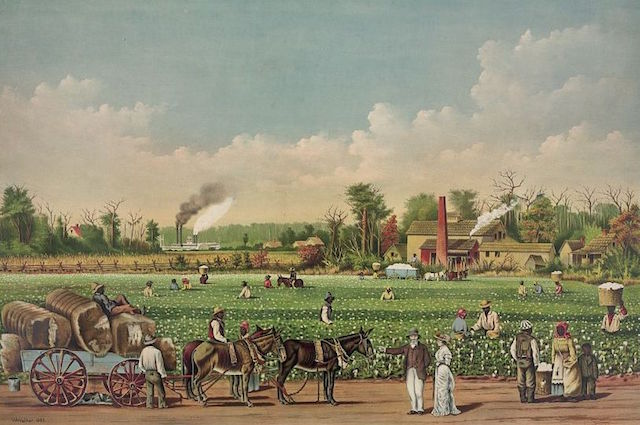The Origins of Cotton in America
The production of cotton is an industry deeply rooted in the fabric of America's history, particularly in the south. In 1556, the first settlers grew cotton in southern Florida and used it to make homespun clothing. In order to grow properly, cotton requires a warm climate, so the American south is the ideal place for it to be harvested. In the 1730s, England began using American cotton as part of its clothing industry. The cotton from the American south was shipped overseas so the English could spin it into clothing and textiles.
Invention of the Cotton Gin
Cotton is not an easy crop to grow, however; it has to be picked and all of its seeds have to be removed. Until the late 1700s, this task required hours of manual labor. However, in 1793, Eli Whitney invented the cotton gin: a machine that sped up the process of separating cotton from its seeds by a factor of ten. Whitney's invention made it significantly easier to mass-produce cotton and make money from it, causing the American cotton industry to grow from an annual revenue of 150,000 to 8 million dollars. And with the money, the greed of cotton planters grew. Planters needed more workers in their fields to harvest more cotton and make even more money. Those workers came in the form of slaves forcibly taken from Africa and made to work for no pay in the southern heat. Slave labor increased in cotton fields in the 1800s, powering the cotton industry and the selling of textiles. In the 1830s and 1840s, one slogan captured the growth of the American economy: "cotton is king."
 |
| Eli Whitney's Cotton Gin Patent |
Cause of the Civil War
The harsh treatment of slaves in cotton fields led to unrest. Many northern abolitionists felt that slave labor was inhumane and should end. Southern plantation owners were big supporters of slavery, since without it, cotton production would collapse. Cotton was the biggest crop in the south; if there weren't enough hands in the field to produce it, the southern economy would hit rock bottom. Because of this, tensions continued to increase between northern and southern America, making the cotton crop one of the major causes of the American Civil War from 1861-1865. After the war, northern victory, and freeing of slaves, the cotton industry took a major hit. In 1892, cotton bud-eating beetles known as boll weevils came into the south from Mexico, destroying cotton crops. By the time measures were put in place to stop the weevils in the 1950s, the industry had already lost over 22 billion dollars. Today, the cotton clothing industry is still strong in the United States: a grim reminder of the time when both cotton, and slave labor, were king.
 |
| A Cotton Farm in Mississippi |



